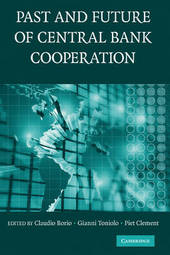
|
The Past and Future of Central Bank Cooperation
Hardback
Main Details
| Title |
The Past and Future of Central Bank Cooperation
|
| Authors and Contributors |
Edited by Claudio Borio
|
|
Edited by Gianni Toniolo
|
|
Edited by Piet Clement
|
| Series | Studies in Macroeconomic History |
|---|
| Physical Properties |
| Format:Hardback | | Pages:260 | | Dimensions(mm): Height 229,Width 152 |
|
| Category/Genre | International finance
Banking |
|---|
| ISBN/Barcode |
9780521877794
|
| Classifications | Dewey:332.15 |
|---|
| Audience | | Tertiary Education (US: College) | |
|---|
|
Publishing Details |
| Publisher |
Cambridge University Press
|
| Imprint |
Cambridge University Press
|
| Publication Date |
11 August 2008 |
| Publication Country |
United Kingdom
|
Description
This book explores the past and future of central bank cooperation. In today's global economy, the cooperation between central banks is a key element in maintaining or restoring monetary and financial stability, thereby ensuring a smooth functioning of the international financial system. In this book, economists, historians, and political scientists look back at the experience of central bank cooperation during the past century - at its goals, nature, and processes and at its successes and failures - and draw lessons for the future. Particular attention is devoted to the role played by central bank cooperation in the formulation of minimum capital standards for internationally active banks (the Basel Capital Accord, Basel II), and in the process of European monetary unification and the introduction of the Euro.
Author Biography
Claudio Borio is Head of Research and Policy Analysis at the Bank for International Settlements (BIS), where he has worked since 1987 covering various responsibilities in the Monetary and Economic Department. Dr. Borio was formerly a Lecturer and Research Fellow at Brasenose College, Oxford and an economist at the Organisation for Economic Co-operation and Development (OECD). He holds a D.Phil. and an M.Phil. in economics from Oxford and has published extensively in the fields of monetary policy, banking, finance, and issues related to financial stability. Gianni Toniolo is Research Professor of Economics and History at Duke University, Durham, NC; a Research Fellow of the Centre for Economic Policy Research (CEPR), London; and a member of the Academia Europaea. He was previously Professor of Economics at the University of Rome, Tor Vergata, and at Ca'Foscari, the University of Venice. He is a former President of the European Historical Economics Society. Toniolo's books include An Economic History of Liberal Italy, 1850-1918 (1990); Central Bank Cooperation at the Bank for International Settlements (Cambridge University Press, 2005, with the assistance of Piet Clement); and The International Economy Between the Wars (2008, with Charles H. Feinstein and Peter Temin). Piet Clement is Head of Library, Archives and Research Support at the Bank for International Settlements. He holds a Ph.D. from the Catholic University of Leuven, Belgium, and has published on the history of international cooperation and of the BIS.
Reviews'Central banks play as central a role in economic welfare and financial stability today as they have ever played. And globalization makes cooperation among monetary and financial authorities even more crucial than before. This volume throws valuable new light on the way cooperation has been conducted in the past and on some of the key issues that will confront central bank collaboration in the future.' Sir Andrew Crockett, President, JP Morgan Chase International 'This clear and well researched book on 130 years of central bank cooperation will be a unique tool for historians and economists. It doesn't discuss the desirability of cooperation but it explains how it worked (or, in some cases, did not work).' Jacques de Larosiere, Former President, European Bank for Reconstruction and Development 'The worldwide financial crisis of 2007-08 makes this book very timely. Surveying more than a century of experience, the authors demonstrate that central bank cooperation can help to avoid financial crises or limit the economic damage resulting from them. Conversely, non-cooperation can have disastrous consequences. The book is required reading for central bankers, economic policymakers, and all concerned with our defenses against financial and e Richard Sylla, Stern School of Business, New York University
|